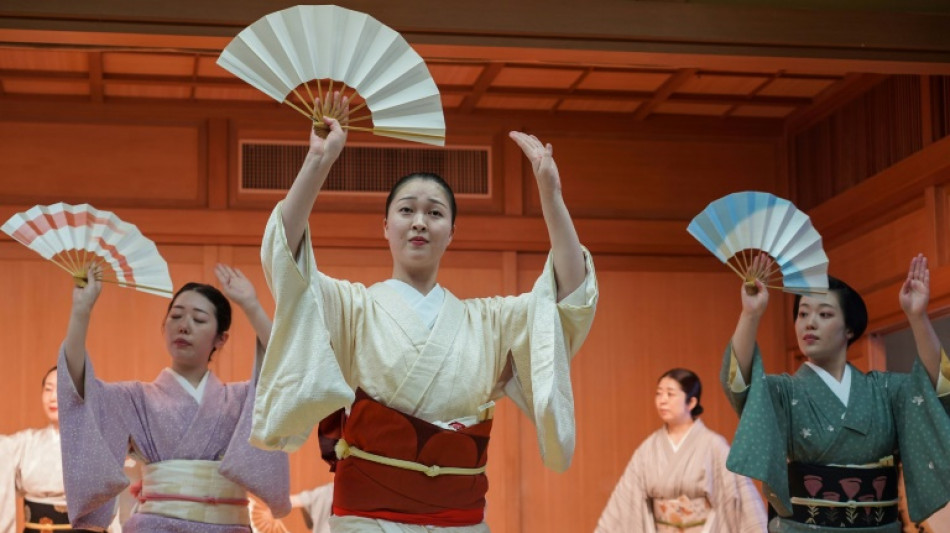
-
 US Supreme Court appears skeptical of Trump tariff legality
US Supreme Court appears skeptical of Trump tariff legality
-
AC Milan post third straight annual profit on day of San Siro purchase

-
 Angelina Jolie visits Ukrainian frontline city, media reports say
Angelina Jolie visits Ukrainian frontline city, media reports say
-
UN says forests should form key plank of COP30

-
 Star designer Rousteing quits fashion group Balmain
Star designer Rousteing quits fashion group Balmain
-
Mexico's Sheinbaum steps up cartel fight after murder of anti-narco mayor

-
 Attack on funeral in Sudan's Kordofan region kills 40: UN
Attack on funeral in Sudan's Kordofan region kills 40: UN
-
Key PSG trio set for spell on sidelines

-
 Democrats punch back in US elections - and see hope for 2026
Democrats punch back in US elections - and see hope for 2026
-
BMW reports rising profitability, shares jump

-
 Bolivia Supreme Court orders release of jailed ex-president Jeanine Anez
Bolivia Supreme Court orders release of jailed ex-president Jeanine Anez
-
Wall Street stocks rise after positive jobs data

-
 'Hostage diplomacy': longstanding Iran tactic presenting dilemma for West
'Hostage diplomacy': longstanding Iran tactic presenting dilemma for West
-
Rybakina stays perfect at WTA Finals with win over alternate Alexandrova

-
 Le Garrec welcomes Dupont help in training for Springboks showdown
Le Garrec welcomes Dupont help in training for Springboks showdown
-
Brussels wants high-speed rail linking EU capitals by 2040

-
 Swiss business chiefs met Trump on tariffs: Bern
Swiss business chiefs met Trump on tariffs: Bern
-
Spain's exiled king recounts history, scandals in wistful memoir

-
 Wall Street stocks steady after positive jobs data
Wall Street stocks steady after positive jobs data
-
Trump blasts Democrats as government shutdown becomes longest ever

-
 Indian pilgrims find 'warm welcome' in Pakistan despite tensions
Indian pilgrims find 'warm welcome' in Pakistan despite tensions
-
Inter and AC Milan complete purchase of San Siro

-
 Swedish authorities inspect worksite conditions at steel startup Stegra
Swedish authorities inspect worksite conditions at steel startup Stegra
-
Keys withdraws from WTA Finals with illness

-
 Prince Harry says proud to be British despite new life in US
Prince Harry says proud to be British despite new life in US
-
EU strikes last-ditch deal on climate targets as COP30 looms

-
 Stocks retreat as tech bubble fears grow
Stocks retreat as tech bubble fears grow
-
Shein opens first permanent store amid heavy police presence

-
 West Indies edge New Zealand despite Santner brilliance
West Indies edge New Zealand despite Santner brilliance
-
French pair released by Iran await return home

-
 German factory orders up but outlook still muted
German factory orders up but outlook still muted
-
Death toll tops 100 as Philippines digs out after typhoon

-
 Attack on key city in Sudan's Kordofan region kills 40: UN
Attack on key city in Sudan's Kordofan region kills 40: UN
-
'No one could stop it': Sudanese describe mass rapes while fleeing El-Fasher

-
 Champagne and cheers across New York as Mamdani soars to victory
Champagne and cheers across New York as Mamdani soars to victory
-
Medieval tower collapse adds to Italy's workplace toll

-
 BMW boosts profitability despite China, tariff woes
BMW boosts profitability despite China, tariff woes
-
South Africa's Wiese wary of 'hurt' France before re-match

-
 Beyond limits: Croatian freediver's breathtaking record
Beyond limits: Croatian freediver's breathtaking record
-
Tottenham supporting Udogie after alleged gun threat in London

-
 Thunder roll Clippers to stay unbeaten as SGA keeps streak alive
Thunder roll Clippers to stay unbeaten as SGA keeps streak alive
-
In appeal, Australian mushroom murderer alleges 'miscarriage of justice'

-
 Toyota hikes profit forecasts 'despite US tariffs'
Toyota hikes profit forecasts 'despite US tariffs'
-
Ex-France lock Willemse challenges Meafou to become 'the bully'

-
 Ukrainians to honour sporting dead by building country they 'died for': minister
Ukrainians to honour sporting dead by building country they 'died for': minister
-
At least 7 dead after UPS cargo plane crashes near Louisville airport

-
 US Supreme Court hears challenge to Trump tariff powers
US Supreme Court hears challenge to Trump tariff powers
-
US government shutdown becomes longest in history

-
 India's Modi readies bellwether poll in poorest state
India's Modi readies bellwether poll in poorest state
-
Green goals versus growth needs: India's climate scorecard


Century-old Tokyo geisha festival revives dying art
The geishas glide with measured steps across a wooden stage, offering a glimpse of a long-misunderstood tradition that is becoming a rare sight in Japan.
Dancing with paper fans and dressed in kimonos, the entertainers were rehearsing without the striking white make-up and sculpted hairstyles they are famous for.
But for seven days from Wednesday the women will perform in full splendour at the 100-year-old Azuma Odori festival at a theatre in the heart of the Japanese capital.
In the popular imagination geishas are often confused with courtesans, but in fact their work -- as trained masters of refined old artforms -- does not involve selling sex.
"Japanese people themselves often don't understand or have the wrong idea about what geishas do," Hisafumi Iwashita, a writer specialised in geisha culture, told AFP.
In Japanese, the word geisha means "person of the arts" — a woman or man trained in traditional Japanese performing arts. But the core role of geishas goes far beyond "just dancing and singing," Iwashita said.
Geishas in different parts of Japan are also known for different skills.
In Kyoto, where they are called geikos, "dance is seen as the most important artform," Iwashita said.
Tokyo geishas meanwhile are known for their singing and talents on the shamisen, which resembles a slim three-stringed guitar.
This year for the first time ever, geishas from 19 Japanese regions are participating in the annual Azuma Odori, as well as those from Tokyo's Shinbashi district who usually perform.
Around 180 geishas will take part overall, taking to the stage in small groups for two shows each day.
Koiku, a Shinbashi geisha, said her job first and foremost involves "welcoming and entertaining visitors at traditional restaurants called ryotei".
Entry to these expensive, exclusive establishments, found in historic geisha districts known as hanamachi, is by invitation only.
- 10 year's training -
Today around 40 geishas work in Shinbashi -- many fewer than in times gone by -- and all of them will appear at the Azuma Odori.
"Not so long ago, there were 100 of us, then 60... and the number keeps going down," Koiku said.
Life as a geisha is tough, with a strict practice schedule even for established performers.
"In general, it takes 10 years to be seen as competent," said Koiku, who was enticed by her love of music and dance.
The geishas' choreography, watched by their instructors and accompanied by live musicians at the rehearsal, includes playful touches such as miming the movements of a fox.
It is not polite to ask a geisha's age, but some taking part in the show have been performing for five or six decades.
Koiku said she is worried that if nothing changes, it will be "too late" for the waning geisha tradition.
Azuma Odori's roots date back to Japan's 1868-1912 Meiji era, when dance began to take a more central role in geisha performances.
Geishas, who would entertain government officials at banquets, played "a key role" in shaping modern Japanese culture, according to the expert Iwashita.
He thinks the main reason for the falling number of geishas in Japan is simply that they have fewer clients.
While geishas once made a living from Japan's wealthy elite, in 1993 then-prime minister Morihiro Hosokawa called for an end to government banquets in ryotei restaurants.
That was a "tough blow for the industry", Iwashita said.
Koiku agrees that the "world has changed" -- including the type of socialising where business deals are sought.
"Nowadays, companies are increasingly organising receptions in their offices or other venues," she said.
Shinbashi Enbujo Theatre, where Azuma Odori will take place, was inaugurated in 1925 with the festival's first edition.
It was rebuilt in 1948 after being destroyed in World War II, and its lavish post-war performances influenced Japanese kabuki theatre before being simplified to audience tastes.
With the future of the geisha profession uncertain, for Iwashita, "the fact that such a theatre still exists, and that it is the 100th anniversary (of Azuma Odori) is nothing short of a miracle".
P.Vogel--VB



